黑龙江省安达市第七中学2019-2020学年高一3月月考英语试卷(Word版无听力试题)
文档属性
| 名称 | 黑龙江省安达市第七中学2019-2020学年高一3月月考英语试卷(Word版无听力试题) | 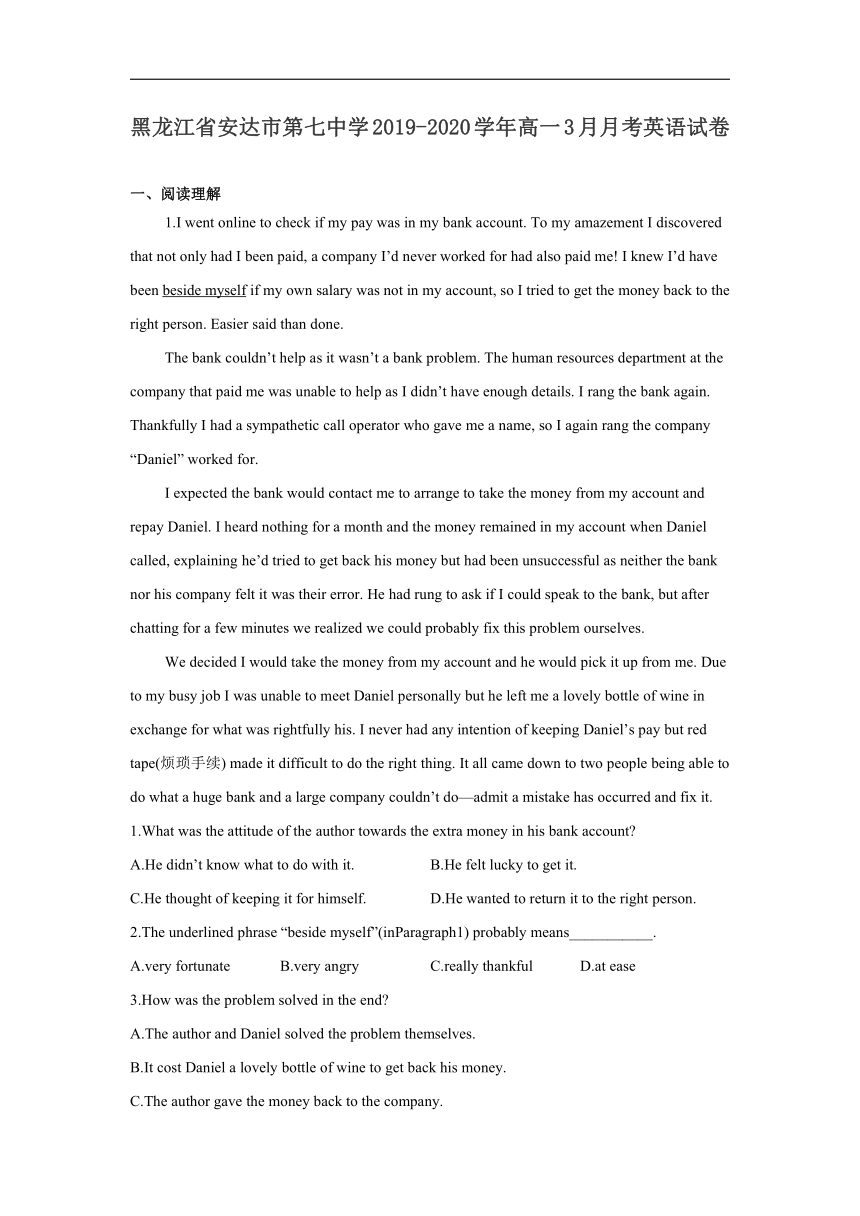 | |
| 格式 | zip | ||
| 文件大小 | 131.5KB | ||
| 资源类型 | 教案 | ||
| 版本资源 | 外研版 | ||
| 科目 | 英语 | ||
| 更新时间 | 2020-04-10 19:25:37 | ||
图片预览

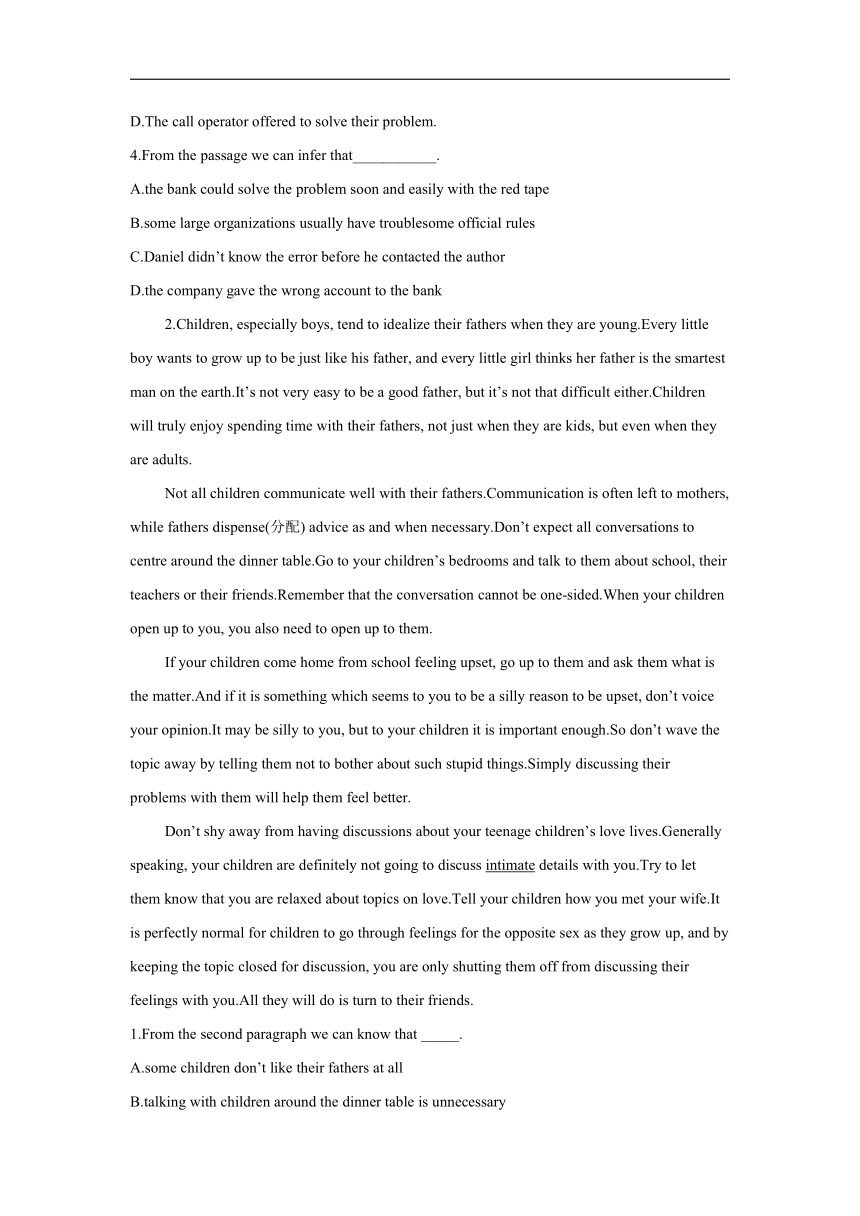
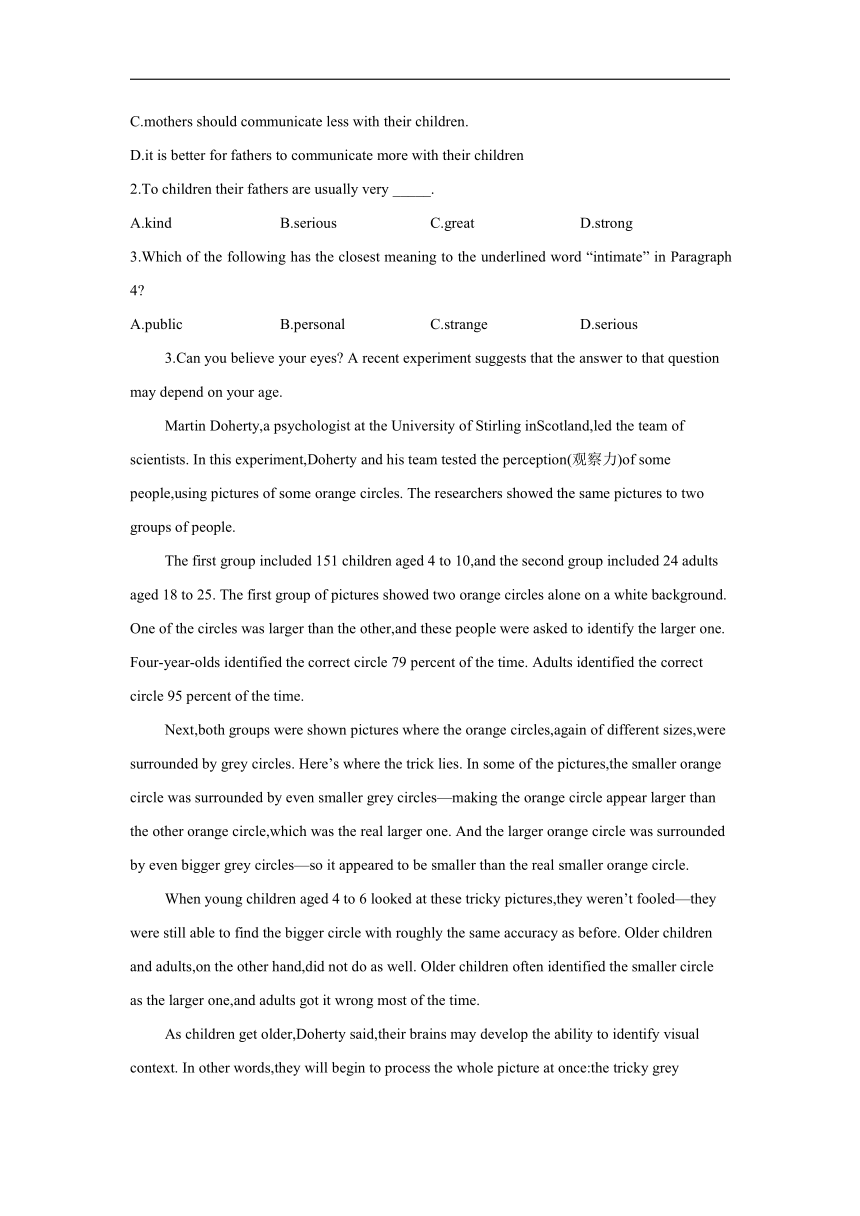
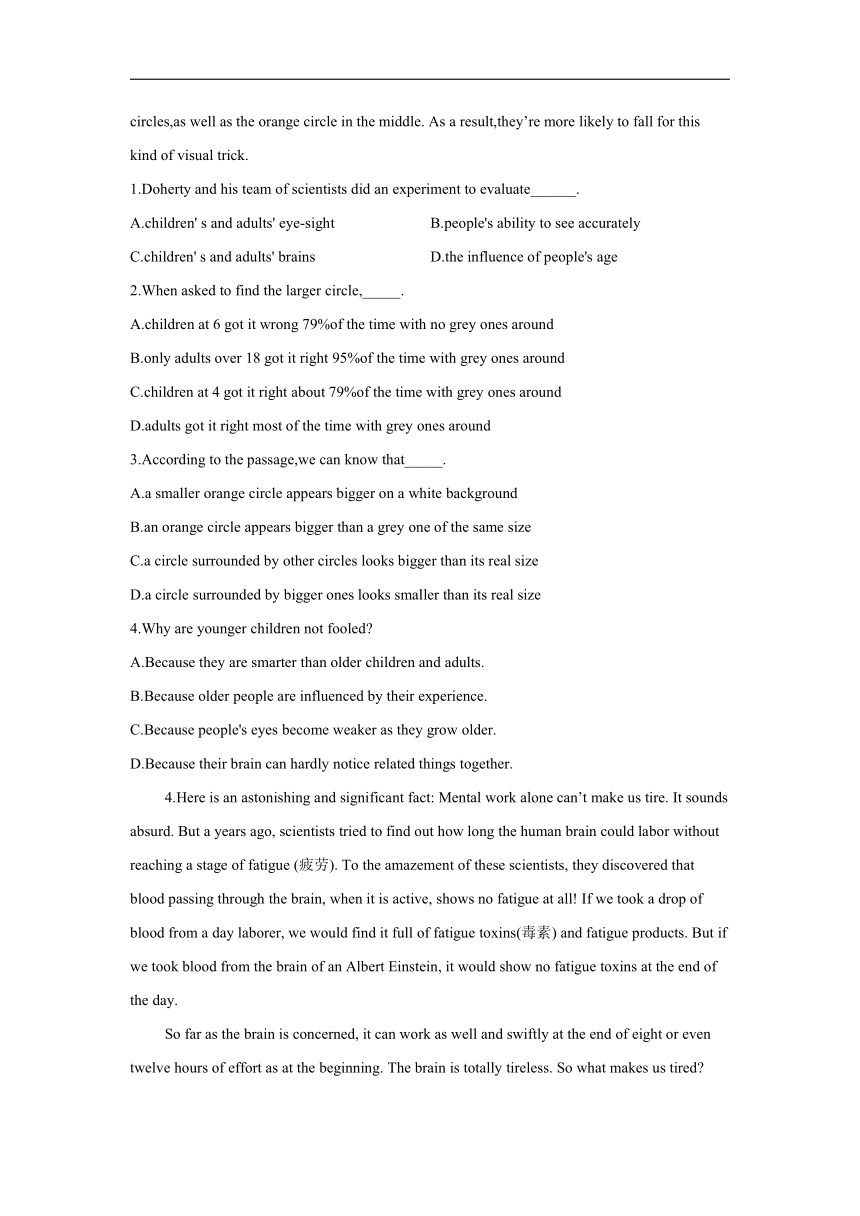
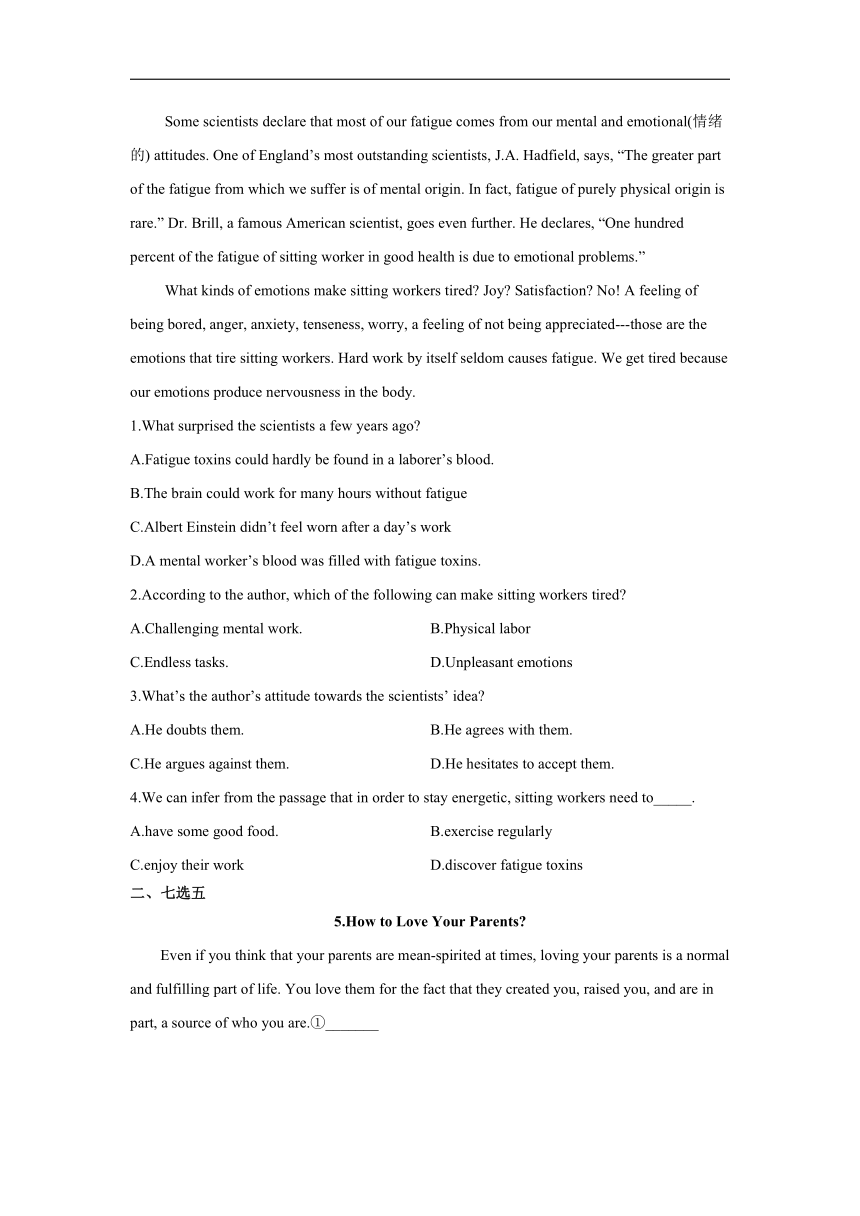
文档简介
黑龙江省安达市第七中学2019-2020学年高一3月月考英语试卷
一、阅读理解
1.I went online to check if my pay was in my bank account. To my amazement I discovered that not only had I been paid, a company I’d never worked for had also paid me! I knew I’d have been beside myself if my own salary was not in my account, so I tried to get the money back to the right person. Easier said than done.
The bank couldn’t help as it wasn’t a bank problem. The human resources department at the company that paid me was unable to help as I didn’t have enough details. I rang the bank again. Thankfully I had a sympathetic call operator who gave me a name, so I again rang the company “Daniel” worked for.
I expected the bank would contact me to arrange to take the money from my account and repay Daniel. I heard nothing for a month and the money remained in my account when Daniel called, explaining he’d tried to get back his money but had been unsuccessful as neither the bank nor his company felt it was their error. He had rung to ask if I could speak to the bank, but after chatting for a few minutes we realized we could probably fix this problem ourselves.
We decided I would take the money from my account and he would pick it up from me. Due to my busy job I was unable to meet Daniel personally but he left me a lovely bottle of wine in exchange for what was rightfully his. I never had any intention of keeping Daniel’s pay but red tape(烦琐手续) made it difficult to do the right thing. It all came down to two people being able to do what a huge bank and a large company couldn’t do—admit a mistake has occurred and fix it.
1.What was the attitude of the author towards the extra money in his bank account?
A.He didn’t know what to do with it. B.He felt lucky to get it.
C.He thought of keeping it for himself. D.He wanted to return it to the right person.
2.The underlined phrase “beside myself”(inParagraph1) probably means___________.
A.very fortunate B.very angry C.really thankful D.at ease
3.How was the problem solved in the end?
A.The author and Daniel solved the problem themselves.
B.It cost Daniel a lovely bottle of wine to get back his money.
C.The author gave the money back to the company.
D.The call operator offered to solve their problem.
4.From the passage we can infer that___________.
A.the bank could solve the problem soon and easily with the red tape
B.some large organizations usually have troublesome official rules
C.Daniel didn’t know the error before he contacted the author
D.the company gave the wrong account to the bank
2.Children, especially boys, tend to idealize their fathers when they are young.Every little boy wants to grow up to be just like his father, and every little girl thinks her father is the smartest man on the earth.It’s not very easy to be a good father, but it’s not that difficult either.Children will truly enjoy spending time with their fathers, not just when they are kids, but even when they are adults.
Not all children communicate well with their fathers.Communication is often left to mothers, while fathers dispense(分配) advice as and when necessary.Don’t expect all conversations to centre around the dinner table.Go to your children’s bedrooms and talk to them about school, their teachers or their friends.Remember that the conversation cannot be one-sided.When your children open up to you, you also need to open up to them.
If your children come home from school feeling upset, go up to them and ask them what is the matter.And if it is something which seems to you to be a silly reason to be upset, don’t voice your opinion.It may be silly to you, but to your children it is important enough.So don’t wave the topic away by telling them not to bother about such stupid things.Simply discussing their problems with them will help them feel better.
Don’t shy away from having discussions about your teenage children’s love lives.Generally speaking, your children are definitely not going to discuss intimate details with you.Try to let them know that you are relaxed about topics on love.Tell your children how you met your wife.It is perfectly normal for children to go through feelings for the opposite sex as they grow up, and by keeping the topic closed for discussion, you are only shutting them off from discussing their feelings with you.All they will do is turn to their friends.
1.From the second paragraph we can know that _____.
A.some children don’t like their fathers at all
B.talking with children around the dinner table is unnecessary
C.mothers should communicate less with their children.
D.it is better for fathers to communicate more with their children
2.To children their fathers are usually very _____.
A.kind B.serious C.great D.strong
3.Which of the following has the closest meaning to the underlined word “intimate” in Paragraph 4?
A.public B.personal C.strange D.serious
3.Can you believe your eyes? A recent experiment suggests that the answer to that question may depend on your age.
Martin Doherty,a psychologist at the University of Stirling inScotland,led the team of scientists. In this experiment,Doherty and his team tested the perception(观察力)of some people,using pictures of some orange circles. The researchers showed the same pictures to two groups of people.
The first group included 151 children aged 4 to 10,and the second group included 24 adults aged 18 to 25. The first group of pictures showed two orange circles alone on a white background. One of the circles was larger than the other,and these people were asked to identify the larger one. Four-year-olds identified the correct circle 79 percent of the time. Adults identified the correct circle 95 percent of the time.
Next,both groups were shown pictures where the orange circles,again of different sizes,were surrounded by grey circles. Here’s where the trick lies. In some of the pictures,the smaller orange circle was surrounded by even smaller grey circles—making the orange circle appear larger than the other orange circle,which was the real larger one. And the larger orange circle was surrounded by even bigger grey circles—so it appeared to be smaller than the real smaller orange circle.
When young children aged 4 to 6 looked at these tricky pictures,they weren’t fooled—they were still able to find the bigger circle with roughly the same accuracy as before. Older children and adults,on the other hand,did not do as well. Older children often identified the smaller circle as the larger one,and adults got it wrong most of the time.
As children get older,Doherty said,their brains may develop the ability to identify visual context. In other words,they will begin to process the whole picture at once:the tricky grey circles,as well as the orange circle in the middle. As a result,they’re more likely to fall for this kind of visual trick.
1.Doherty and his team of scientists did an experiment to evaluate______.
A.children' s and adults' eye-sight B.people's ability to see accurately
C.children' s and adults' brains D.the influence of people's age
2.When asked to find the larger circle,_____.
A.children at 6 got it wrong 79%of the time with no grey ones around
B.only adults over 18 got it right 95%of the time with grey ones around
C.children at 4 got it right about 79%of the time with grey ones around
D.adults got it right most of the time with grey ones around
3.According to the passage,we can know that_____.
A.a smaller orange circle appears bigger on a white background
B.an orange circle appears bigger than a grey one of the same size
C.a circle surrounded by other circles looks bigger than its real size
D.a circle surrounded by bigger ones looks smaller than its real size
4.Why are younger children not fooled?
A.Because they are smarter than older children and adults.
B.Because older people are influenced by their experience.
C.Because people's eyes become weaker as they grow older.
D.Because their brain can hardly notice related things together.
4.Here is an astonishing and significant fact: Mental work alone can’t make us tire. It sounds absurd. But a years ago, scientists tried to find out how long the human brain could labor without reaching a stage of fatigue (疲劳). To the amazement of these scientists, they discovered that blood passing through the brain, when it is active, shows no fatigue at all! If we took a drop of blood from a day laborer, we would find it full of fatigue toxins(毒素) and fatigue products. But if we took blood from the brain of an Albert Einstein, it would show no fatigue toxins at the end of the day.
So far as the brain is concerned, it can work as well and swiftly at the end of eight or even twelve hours of effort as at the beginning. The brain is totally tireless. So what makes us tired?
Some scientists declare that most of our fatigue comes from our mental and emotional(情绪的) attitudes. One of England’s most outstanding scientists, J.A. Hadfield, says, “The greater part of the fatigue from which we suffer is of mental origin. In fact, fatigue of purely physical origin is rare.” Dr. Brill, a famous American scientist, goes even further. He declares, “One hundred percent of the fatigue of sitting worker in good health is due to emotional problems.”
What kinds of emotions make sitting workers tired? Joy? Satisfaction? No! A feeling of being bored, anger, anxiety, tenseness, worry, a feeling of not being appreciated---those are the emotions that tire sitting workers. Hard work by itself seldom causes fatigue. We get tired because our emotions produce nervousness in the body.
1.What surprised the scientists a few years ago?
A.Fatigue toxins could hardly be found in a laborer’s blood.
B.The brain could work for many hours without fatigue
C.Albert Einstein didn’t feel worn after a day’s work
D.A mental worker’s blood was filled with fatigue toxins.
2.According to the author, which of the following can make sitting workers tired?
A.Challenging mental work. B.Physical labor
C.Endless tasks. D.Unpleasant emotions
3.What’s the author’s attitude towards the scientists’ idea?
A.He doubts them. B.He agrees with them.
C.He argues against them. D.He hesitates to accept them.
4.We can infer from the passage that in order to stay energetic, sitting workers need to_____.
A.have some good food. B.exercise regularly
C.enjoy their work D.discover fatigue toxins
二、七选五
5.How to Love Your Parents?
Even if you think that your parents are mean-spirited at times, loving your parents is a normal and fulfilling part of life. You love them for the fact that they created you, raised you, and are in part, a source of who you are.①_______
Tell them you love them every morning. A gentle "good morning" and "I love you" will warm a coldest heart. Remember that they brought you into this world. Without your parents, you might still wander at an unknown corner in an unknown world.
Respect them more and cherish these moments. You can use these moments to learn from them, preparing yourself for when you're off on your own. It's OK to get angry but angry actions don't help you or your parents. Act calmly, cool off, write down your feelings, or talk to a friend. ②_______
Obey their requests. It will make your attitude better and earn you more respect from them. It may seem like you are going through hell when you don't get what you want or you have to clean. However, you had better remember they keep a roof over your head when it's cold, raining, snowing, or too hot. Understand that parents are human beings and make mistakes.③_______ Since you can forgive your friends, why not forgive your parents?
Keep company with them. Do things with your parents like watching TV, or going somewhere with them.④_______ Listen to their old stories and learn from them. You will find they are your teachers in this way or another.
Some people simply may not be able to love their parents.⑤_______ Seek help if you are being abused in any way. Parents do not have a right to harm you.
A. Parents will in turn express their love to you.
B. Forgiveness is the key.
C. Here are some ways to love your parents.
D. There can be realistic reasons for this, family violence for example
E. Anyway, spend as much time with them as you can.
F. After this, share your feeling with your parents.
G. Please remember parents are as important as friends.
三、完形填空
6.When I was 8, a gentleman came to my orphanage(孤儿院)and taught us how to do woodworking projects.
I remember my first project—a small table. I was so???? 1??? ?of it that I looked upon it as if I had created a(an) ??? 2??? . It was absolutely beautiful and it had taken me six weeks to ??? 3?????it. I could hardly wait to give it to Mother Winters as a ???? 4??? . She was the head mistress of our orphanage, who was always???? 5??? ?with us.
As the tables were not dry from the clear coating, the man told us to wait a few days before taking them to our dormitories. But I was just so ??? 6??? ?and happy that I couldn’t wait. I dashed out like a ???? 7??? , carrying my table, smiling from ear to ear.
When I reached the dormitory I placed the little table beside my bed. I was???? 8??? ?it when Mother Winters entered. She walked over to the table. Running her hand???? 9??? ?it, she noticed that it was still wet.
“Were you ??? 10??? ?to bring this home?” she asked.
“No, ma’am,” I???? 11??? ?with my head down.
She ordered me to throw the table out and so I did. After she left, I immediately opened the door to get it back. There was ??? 12??? ?stuck all over. I brushed and cried, but it would not come off.
I hid the table in my closet and never ??? 13??? ?it. A year later while cleaning up, I gave the table to Mother Henderson, my houseparent(宿管员), thinking that she would ??? 14??? ?it away.
Thirty years later at a reunion, I ??? 15??? ?that Mother Henderson was living nearby, so I drove up to see her. We talked cheerfully for long. As I was about to leave, she asked me to come down to her???? 16??? ?to get something important. I followed her ??? 17??? ?into a dark corner. She picked something up.??? 18??? ?she turned around, I could see that she was holding a little table.
Mother Henderson kept the little table that I had given up for lost so long ago.
Today, I look at that table with bittersweet memories but full of ??? 19??? ?to Mother Henderson, who kept it for a young orphan who tried very hard to???? 20??? .
1.A.tired???? B.ashamed???? C.proud???? D.aware
2.A.award???? B.wonder???? C.record???? D.product
3.A.design???? B.invent???? C.paint???? D.buy
4.A.gift???? B.reward???? C.prize???? D.souvenir(纪念碑)
5.A.satisfied???? B.strict???? C.patient???? D.angry
6.A.upset???? B.amazed???? C.confident???? D.excited
7.A.thief???? B.hero???? C.sword???? D.flash
8.A.drying???? B.observing???? C.admiring???? D.hiding
9.A.into???? B.across???? C.above???? D.after
10.A.supposed???? B.embarrassed???? C.encouraged???? D.determined
11.A.agreed???? B.sighed???? C.whispered???? D.argued
12.A.dirt???? B.glue???? C.paint???? D.wood
13.A.removed???? B.touched???? C.shook???? D.split
14.A.put???? B.give???? C.take???? D.throw
15.A.learned???? B.expected???? C.remembered???? D.recommended
16.A.bathroom???? B.balcony(阳台)???? C.basement???? D.bedroom
17.A.curiously???? B.unwillingly???? C.doubtfully???? D.worriedly
18.A.Before???? B.Since???? C.As???? D.Until
19.A.admiration???? B.gratitude???? C.sympathy???? D.regret
20.A.adapt???? B.study???? C.perform???? D.please
四、语法填空
7.Pat was a poor Irishman with a large family and one morning, waking up early from cold and hunger, he decided to go shooting in a wood near his cottage.
The wood ①_______(belong)to Lord Northwood, a rich gentleman, and Pat had no right ②_______(go)there, but there were lots of rabbits and flocks of birds ③_______were good to eat, and Pat decided to take the risk.?Suddenly he saw the owner, with a group of friends, ④_______(come)towards him in the wood. There was a look of anger on Lord Northwood’s face ⑤_______he saw the gun in Pat’s hands. Pat’s heart sank with fear, but he saw there was no hope of escape, so he walked ⑥_______(brave)up to them and asked, “Good morning, sir, and what has brought you out so early this morning?” Lord Northwood , rather ⑦_______(surprise),said he and his friends were taking a little exercise to get an appetite ⑧_______their breakfast. Then looking at Pat, he said, “But why are you out so early in the morning?”?
“Well, sir,” said Pat, “I just came out to see if I could get a breakfast for ⑨_______(I) appetite.” The whole crowd burst into ⑩_______(laugh) at Pat’s ready wit, and with a smile Lord Northwood walked on leaving Pat to try his luck with the rabbits.?
五、短文改错
8.下面短文中有10处错误。错误涉及一个单词的增加、删除或修改。
增加:在缺词处加一个漏词符号(∧),并在此符号下面写出该加的词。
删除:把多余的词用斜线(\)划掉。
修改:在错的词下划一横线,并在该词下面写出修改后的词。
注意:每处错误及其修改均仅限一词;
I am an 18-year-old middle school student. I have been busy with my study and seldom helped my parents in the housework. Felt quite sorry for that, I began to think about how to do to help. Last Sunday, when my parents went out shopping, I suddenly got an idea: why not to give the rooms a thorough cleaning? Firstly I collected all the books, newspapers and another things scattered in the rooms and put them in place. Then I wiped the dust of all the furnitures. After that, I sweep and mopped the floors.
At this very moment, my parents came back and were quite surprise to see all the rooms tidily and floors shining. My mother gave me hug. Tired as I was, I never felt so happy.
六、书面表达
9.“十一”黄金周(golden week)刚刚结束,假设你是李华,在参加某旅游公司组织的某地一日游当中遭遇了一系列服务问题。请你根据所给提示给当地旅游公司经理写一封投诉信。
1. 交通工具不合规;
2. 饭菜质量低劣;
3. 强行购物,错过景点。注意:(1)词数100左右(开头结尾已给出,但不计入总词数);????? (2)可以适当增加细节,使行文连贯。
Dear Sir or Madam,
_______________________________________________________________________________________________________________________________________________________________________________________________________________________________________________________________________________________________________________________________________________________________________________________________________________
Yours sincerely,
Li Hua
参考答案
1.答案:1.D; 2.B; 3.A; 4.D
解析:1.细节理解题.根据第一段"if my own salary was not in my account,so I tried to get the money backto the right person"可知,作者打算把账户里多出来的钱还给它真正的主人,故选D.
2.猜测词意题.根据"if my own salary was not in my account"可知,这里假设的是如果没有收到钱,收不到钱的话,作者不可能会感到幸运、感激或放心,排除A、C、D,beside oneself极度兴奋,感情失去控制,这里的意思是"生气",故选B.
3.细节理解题.根据第三段最后"but after chatting for a few minutes we realized we could probably fix this problem ourselves"和第四段可知,作者和Daniel两个人私下把事情解决了,故选A.
4.推理判断题.根据最后一段"two people being able to do what a huge bank and a large company couldn't do-admit a mistake has occurred and fix it."可知,银行和一家大型公司不能解决的事情被两个人解决了,它们不愿承认所犯的错误并加以改正,说明一些大的团体或机构有着繁琐的规定,使本来简单的事情变得繁琐,故选D.
2.答案:1.D; 2.C; 3.B
解析:
3.答案:1.B; 2.C; 3.D; 4.D
解析:1.细节题.根据第二段In this experiment,Doherty and his team tested the perception(观察力) of some people,描述,可知做实验的目的是评估让你们的观察能力,故选B
2.细节题.根据第三段Four-year-olds identified the correct circle 79 percent of the time.…Next,both groups were shown a picture where the orange circles,again of different sizes,were surrounded by gray circles.描述,可知当被要求找出大圆圈时,四岁的孩子的准确率是79%,故选C
3.细节题. 根据第三段Four-year-olds identified the correct circle 79 percent of the time.Adults identified the correct circle 95 percent of the time.描述,可知被大圆圈包围的圆看起来要比真实小一些,故选D
4.推理判断题.根据they were still able to find the bigger circle with roughly the same accuracy as before.描述,可知小孩子没有被愚弄的原因是他们的大脑几乎不会注意到它们的联系,故选D
4.答案:1.B; 2.D; 3.B; 4.C
解析:1.根据第一段Here is an astonishing and significant fact:Mental work alone can't make us tire.可知脑力劳动时间长了并不会让人感觉到累。
2.态度判断题。根据第一段Here is an astonishing and significant fact: Mental work alone can't make us tire. We get tired because our emotions produce nervousness in the body.可知我们感觉到累是因为我们身体里产生了紧张的情绪,在这里可以看出作者是赞同这个观点的。
3.细节理解题。根据第一段Here is an astonishing and significant fact: Mental work alone can't make us tire.可知脑力劳动时间长了并不会让人感觉到累。故选:C。
4.推理判断题。根据最后一段Hard work by itself seldom causes fatigue. We get tired because our emotions produce nervousness in the body.可知只要人们不觉得紧张,能享受生活,那么就能保持精力旺盛,而不会觉得累。
5.答案:1-5 CFBED
解析:1.通读全文可知,下文主要讲了关爱父母的方法,所以本空应选C引出下文的内容。
2.本段主要讲要尊敬父母,珍惜和他们在一起的时光。本空前面讲的是当自己有生气行为时应该怎么做,F项的After this很好地衔接了上句,同时选项中的关键词feelings也是一个提示,故选F项。
3.本空前一句提到父母也会犯错,下句提到你可以原谅你的朋友,为什么不能原谅你的父母?故选B项。这里forgive是个关键词,使上下文语意连贯。
4.从句式特点上看,这里应用祈使句,同时本段主要讲陪伴父母,故选E项。
5.D选项中的this指代空格处前一句的内容,"family violence for example"和下文"如果你正在以某种方式被虐待就寻求帮助对应,故选D项。
6.答案:1.C; 2.B; 3.D; 4.A; 5.B; 6.D; 7.D; 8.C; 9.B; 10.A; 11.C; 12.A; 13.B; 14.D; 15.A; 16.C; 17.A; 18.C; 19.B; 20.D
解析:1.考查形容词:A.tired??累的,B.ashamed羞愧的,C.proud自豪的,D.aware 有意识的,从后面的句子:It was absolutely beautiful and it had taken me six weeks to it.可知作者引以为豪,选C
2.考查名词:A.award奖,B.wonder奇迹,C.record记录D.product产品,我看着它好像是创造了一个奇迹,选B
3.考查动词:A.design设计B.invent发明,C.paint绘画D.complete完成,花了我六个星期完成它,选D
4.考查名词:A.gift礼物,B.reward奖励,C.prize 奖品,D.souvenir纪念品,我迫不及待的想把它送给Mother Winters做为礼物,选A
5.考查形容词:A.satisfied??满意B.strict严格,C.patient耐心,D.angry生气,Mother Winters是我们孤儿院的女院长对我们很严格,选B
6.考查形容词:A.upset不安的B.amazed惊讶的,C.confident自信的,D.excited兴奋,从后面的that I couldn't wait.可知作者太兴奋太高兴等不及了,选D
7.考查名词:A.thief小偷,B.hero英雄,C.sword 剑,D.flash闪光,我像一道闪光冲出去,选D
8.考查动词:A.drying变干,B.observing观察,C.admiring???敬佩,欣赏,D.hiding藏,我正在欣赏它这时Mother Winters进来了,选C
9.考查介词:A.into进入,B.across穿过,C.above在…上面,D.after在…后面,她把手在桌子的表面掠过,发现还是湿的,选B
10.考查动词:A.supposed 应该,B.embarrassed尴尬C.encouraged鼓励D.determined决心,她问我,你应该把它带回来吗?选A
11.考查动词:A.agreed同意B.sighed叹气C.whispered低语,D.argued争论,从后面的with my head down.可知作者头低下小声说,选C
12.考查名词:A.dirt灰尘,B.glue胶水,C.paint油漆,D.wood木材,从后面的I brushed and cried,but it would not come off.可知桌子上沾满了灰尘,选A
13.考查动词:A.removed去除,B.touched触摸,C.shook摇晃,D.split分裂,从前面的句子:I hid the table in my closet可知作者把桌子藏在橱柜里面,不去碰它,选B
14.考查动词:A.put放,B.give给C.take拿D.throw扔,我把桌子给了宿舍管理员,以为她会扔了它,选D
15.考查动词:A.learned学会,得知B.expected期待,C.remembered 记得,D.recommended推荐,30年后我得知Mother Henderson就住在附近,所以我去看她,选A
16.考查名词:A.bathroom浴室,B.balcony阳台,C.basement 地下室,D.bedroom卧室,从come down to可知是带地下室去,选C
17.考查副词:A.curiously好奇的,B.unwillingly不愿意的,C.doubtfully怀疑地,D.worriedly担心的,我好奇的跟着她到了黑暗的角落,选A
18.考查连词:A.Before在…前面,B.Since自从,C.As因为,当…时候,D.Until直到,她转过身来的时候,捡起一个东西,选C
19.考查名词:A.admiration敬佩,B.gratitude感激,C.sympathy同情,D.regret后悔,遗憾,我看着这个带着痛苦经历但是充满了对Mother Henderson的感激的桌子,选B
20.考查动词:A.adapt???适应B.study学习C.perform表现D.please使…高兴,她为努力想要高兴的一个小孤儿保留这个桌子,选D
7.答案:
1. belonged
2. to go
3. that/which
4 coming
5. as/when
6. bravely
7. surprised
8. for
9. my
10. laughter
解析:
8.答案:
I am an 18-year-old middle school student. I have been busy with my study and seldom helped my parents the housework. quite sorry for that, I began to think about to do to help. Last Sunday, when my parents went out shopping, I suddenly got an idea: why not to give the rooms a thorough cleaning? Firstly I collected all the books, newspapers and things scattered in the rooms and put them in place. Then I wiped the dust of all the. After that, I and mopped the floors.
At this very moment, my parents came back and were quite to see all the rooms and floors shining. My mother gave me? hug. Tired as I was, I never felt so happy.
解析:1. in改为with.考查介词.help …with意为"帮助(某人)做(某事)".
2. Felt改为Feeling.考查现在分词.I与feel之间是主谓关系,用现在分词作状语.
3. how改为what.考查疑问词.此处是"疑问代词+不定式"结构作宾语.
4. 去掉to.考查固定搭配.表示建议的时候经常用到这种句式why not do = why don't you do意为"为什么不做某事".
5. another改为other.考查词语用法.another意为"(人,事物)又一个的,再一个的",other意为"另一个;其他的;别的",此处应是后者.
6. furnitures改为furniture.考查名词.furniture是不可数名词,没有复数形式.
7. sweep改为swept.考查动词时态.and是并列连词,它前后连接两个相同的语法成分,swept和mopped是并列谓语,都用一般过去时态.
8. surprise改为surprised.考查过去分词.过去分词作表语,多半用来表示人物所处的心理状态或情感变化,其主语多半是人.
9. tidily改为tidy.考查形容词.此处是形容词作宾语补足语.
10. hug前加a.考查冠词.hug是可数名词,单数形式前加不定冠词a表示泛指.
9.答案:
Dear Sir or Madam,
I am writing to make a complaint about your poor service. During golden week of National Day, I joined a one-day trip organized by your company, which was a very unpleasant experience.
First, we were told you would provide a large air-conditioned bus, but we only rode in a shabby bus without any air conditioner. Second ,the food offered by you tasted terrible; some even had sand in it. Last ,the guide led us to several expensive souvenir shops,which wasted too much of our time.As a result, two scenic spots were left unseen in the end. What’s worse, we were required to buy something that we didn’t need at all.
I would really appreciate it if you could give me a reply and I do hope you will take effective measures to improve your service.
Yours sincerely,
Li Hua
解析:
同课章节目录
